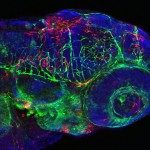Lien vers Pubmed [PMID] – 24039575
PLoS Pathog. 2013;9(9):e1003588
Autophagy, an ancient and highly conserved intracellular degradation process, is viewed as a critical component of innate immunity because of its ability to deliver cytosolic bacteria to the lysosome. However, the role of bacterial autophagy in vivo remains poorly understood. The zebrafish (Danio rerio) has emerged as a vertebrate model for the study of infections because it is optically accessible at the larval stages when the innate immune system is already functional. Here, we have characterized the susceptibility of zebrafish larvae to Shigella flexneri, a paradigm for bacterial autophagy, and have used this model to study Shigella-phagocyte interactions in vivo. Depending on the dose, S. flexneri injected in zebrafish larvae were either cleared in a few days or resulted in a progressive and ultimately fatal infection. Using high resolution live imaging, we found that S. flexneri were rapidly engulfed by macrophages and neutrophils; moreover we discovered a scavenger role for neutrophils in eliminating infected dead macrophages and non-immune cell types that failed to control Shigella infection. We observed that intracellular S. flexneri could escape to the cytosol, induce septin caging and be targeted to autophagy in vivo. Depletion of p62 (sequestosome 1 or SQSTM1), an adaptor protein critical for bacterial autophagy in vitro, significantly increased bacterial burden and host susceptibility to infection. These results show the zebrafish larva as a new model for the study of S. flexneri interaction with phagocytes, and the manipulation of autophagy for anti-bacterial therapy in vivo.






